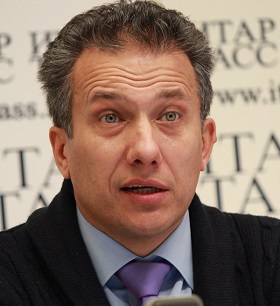Interview
The extraction of natural resources in the Arctic is becoming an increasingly hot topic. We talked to Oleg Korneev, Deputy Director for Geoecology and Engineering Surveys at the SevMorGeo Geological Sea Survey Company, about the feasibility of Arctic development and Russia’s current projects in the area.
Interview
The extraction of natural resources in the Arctic is becoming an increasingly hot topic. We talked to Oleg Korneev, Deputy Director for Geoecology and Engineering Surveys at the SevMorGeo Geological Sea Survey Company, about the feasibility of Arctic development and Russia’s current projects in the area.
Mr. Korneev, do you believe that the extraction of offshore resources in the Arctic is economically viable?
Russia’s Arctic shelf incorporates the Barents Sea, which is freer of ice than other waters and hence more economically attractive, and resource extraction will be launched there this year.
Then comes the Kara Sea, which is also relatively ice-free and resource exploration is a very real possibility there, using surface platforms. Rosneft holds the exploration license to most of the area and is planning to drill the first wells 2015.
The Laptev Sea and East Siberian Sea are icebound for 9-10 months each year, and so exploration would need unmanned subsea platforms. Russia is involved in this kind of project, and is working with Norwegian specialists who have developed a similar field using an unmanned underwater station. But this approach is very expensive.
Can Russia develop its Arctic deposits on its own? Or does it need to attract foreign investors to these projects?
Of course we could attempt to go it alone, but judging by experience, that approach often fails to deliver the desired results. International cooperation is definitely a must, it is important to cherry-pick the best from international cooperation, as South Korea and Japan did. They achieved economic breakthroughs by buying advanced technology patents. Russia should adopt this approach and use the latest technology. It will not be able to accomplish this alone.
How active are other Arctic states as far as resources are concerned?
If we regard the Irish, Russian and Northern seas as part of the Arctic, Britain is definitely in the lead, although since 2004 Norway has made great strides, almost becoming the world’s largest oil operator.
However, the Russian Arctic boasts the mildest climate, with ice compaction at a 30-year-record-low in 2013. The Western Arctic had the least ice, and the Eastern Arctic had the most. Therefore, the Americans and Canadians, in the Eastern Arctic, remain at about the same point in terms of hydrocarbon development. Resource extraction is delayed by the presence of too much ice, prompting the development of subsea production technologies.
Do you see any prospects in extracting Arctic non-hydrocarbon deposits?
Yes, Russia has large placer tin deposits near the Lyakhovsky Islands, which form part of the Novosibirsk (New Siberian) Archipelago. Pevek, Novaya Zemlya and Severnaya Zemlya also boast huge gold reserves, and production underway.
The production of polymetals, or rare earth elements, including from coal-bearing deposits, seems quite promising. The extraction of placer tin and gold in the Arctic shelf is also developing.
Interviewers: Nikolay Markotkin and Darya Khaspekova, RIAC Program Coordinators




